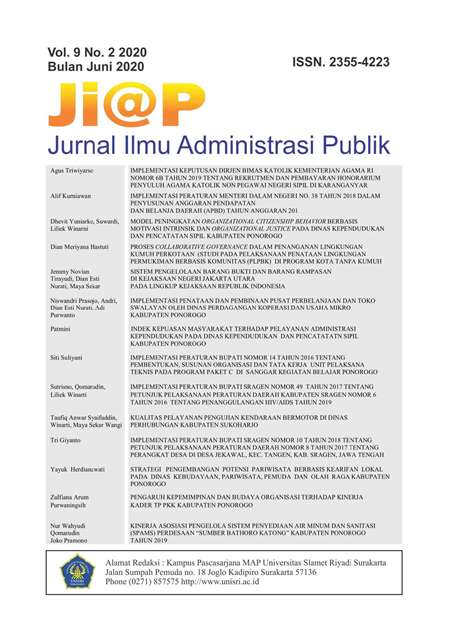PROSES COLLABORATIVE GOVERNANCE DALAM PENANGANAN LINGKUNGAN KUMUH PERKOTAAN (STUDI PADA PELAKSANAAN PENATAAN LINGKUNGAN PERMUKIMAN BERBASIS KOMUNITAS (PLPBK) DI PROGRAM KOTA TANPA KUMUH KABUPATEN PONOROGO)
DOI:
https://doi.org/10.33061/jp.v9i2.3783Keywords:
Collaborative Governance, City Without Slums Program, ProcesAbstract
The Implementation of Community-Based Settlement Environment Structuring ofthe City without Slums Program in Ponorogo Regency also cannot be separated
from good collaboration between the community, the government, the private
sector and other stakeholders. This slum handling cannot be handled if only done
by one or two parties, but requires the participation of various parties or
stakeholders who collaborate collaboratively. This study aims to determine the
process of Collaborative Governance in the Implementation of Community-Based
Settlement Environmental Structuring in the Slumless City Program in Ponorogo
Regency. The theory used includes the theory of good governance, the process of
collaboration, environmental development and the concentration of City Without
Slums. Data collection techniques were carried out by interviewing and observing
the informants using the purporsive sampling method. The data analysis
technique is done by descriptive method. The conclusion of this research is that
the collaborative governance process has been carried out well starting from the
dynamics of Collaboration, Collaborative Actions, and the Temporary Impacts
and Temporary Adaptations of the Collaboration Process. Most of it is done in the
form of participation at all stages of development.
Downloads
Published
2020-06-11
How to Cite
Hastuti, D. M. (2020). PROSES COLLABORATIVE GOVERNANCE DALAM PENANGANAN LINGKUNGAN KUMUH PERKOTAAN (STUDI PADA PELAKSANAAN PENATAAN LINGKUNGAN PERMUKIMAN BERBASIS KOMUNITAS (PLPBK) DI PROGRAM KOTA TANPA KUMUH KABUPATEN PONOROGO). JI@P, 9(2). https://doi.org/10.33061/jp.v9i2.3783
Issue
Section
Artikel
License
Authors who publish this journal agree to the following terms:
- Authors retain copyright and grant the journal right of first publication with the work simultaneously licensed under a Creative Commons Attribution License that allows others to share the work with an acknowledgement of the work's authorship and initial publication in this journal.
- Authors can separately make additional contractual arrangements for non-exclusive distribution published by the journal (e.g., publish it in a book), with an acknowledgement of its initial publication in this journal.
- Authors are allowed and encouraged to send their work via online (e.g., in the institutional repositories or their website) after published by the journal.













